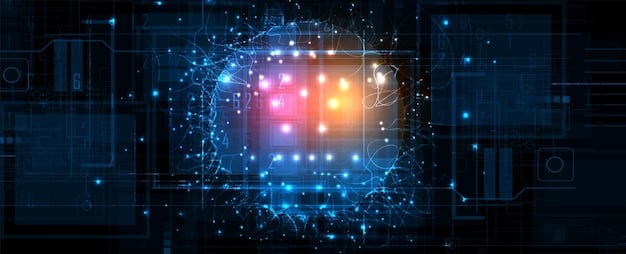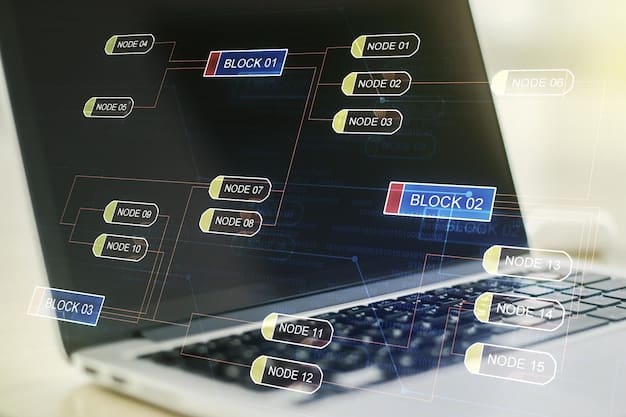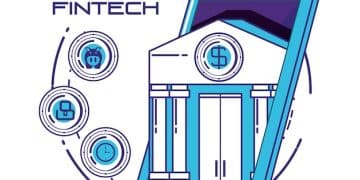Blockchain Oracles: Your Guide to Choosing a Reliable Provider in the US

Blockchain oracles are essential for bringing real-world data onto the blockchain, enabling smart contracts to interact with external information. Choosing a reliable provider in the US requires careful consideration of data accuracy, security measures, and provider reputation.
In the ever-evolving landscape of blockchain technology, smart contracts are revolutionizing various industries. However, smart contracts, by themselves, cannot access data from the outside world. This is where blockchain oracles come into play, acting as bridges that connect blockchains to external data sources. For businesses in the US looking to leverage the power of smart contracts, understanding how to choose a reliable provider for accurate data feeds is crucial. This guide will provide you with the necessary insights to make informed decisions.
Understanding the Role of Blockchain Oracles
Blockchain oracles are entities that connect blockchains to external systems, providing smart contracts with the data they need to execute based on real-world events. They act as intermediaries, verifying and relaying information from off-chain sources to the blockchain. Without oracles, smart contracts would be limited in their functionality, unable to interact with data outside of the blockchain network.
Why are Blockchain Oracles Important?
Oracles are critical for enabling a wide range of applications, making smart contracts practical and versatile. Here’s why they’re so important:
- Bridging the Gap: They allow blockchains to interact with real-world data, which is essential for most practical applications.
- Enabling Complex Smart Contracts: They allow for smart contracts that react to external events, making them more useful.
- Expanding Blockchain Use Cases: They open up new possibilities for blockchain use in various industries.
Choosing a reliable oracle is just as important as writing a secure smart contract. A flawed or unreliable oracle can compromise the entire system.

Key Considerations When Choosing a Blockchain Oracle Provider in the US
When selecting a blockchain oracles provider, several factors should be considered to ensure data accuracy, reliability, and security. These factors will help you evaluate potential providers and choose the best fit for your specific needs.
Data Accuracy and Reliability
The primary function of an oracle is to provide accurate and reliable data. This is paramount for the proper execution of smart contracts. Here are some aspects to consider:
- Data Source Reputation: The oracle should source data from reputable and reliable sources.
- Data Verification Methods: Understand how the oracle verifies the data it provides.
- Historical Accuracy: Check the oracle provider’s track record for providing accurate data in the past.
Consider providers that use multiple data sources to increase the accuracy and reliability of the data feed.
Security Measures
Security is a major concern in blockchain technology, and oracles are no exception. Since oracles act as a bridge between the blockchain and external data, they can be a potential point of attack. Secure oracles are critical for a secure smart contract ecosystem.
- Secure Communication Protocols: The oracle should use secure communication protocols to prevent tampering with data during transmission.
- Node Security: Oracle nodes should be protected from attacks.
- Decentralization: A decentralized oracle network can reduce the risk of a single point of failure.
Always prioritize providers that invest in robust security measures to protect the integrity of their data feeds.
In summary, the accuracy and security of the blockchain oracles are paramount to make sure that the smart contracts are running smoothly.
Evaluating Potential Blockchain Oracle Providers
Now that you understand the key considerations, it is time to evaluate potential blockchain oracles providers. This process involves researching and comparing different providers based on your specific needs and requirements.
Researching Providers
Start by researching different oracle providers in the US. Look for providers that specialize in your industry or data type. Some popular oracle providers include:
- Chainlink: A decentralized oracle network that provides a wide range of data feeds.
- Provable (formerly Oraclize): Offers secure oracle services for various blockchain applications.
- API3: Focuses on providing transparent and verifiable data feeds directly from API providers.
Read reviews, check their documentation, and see if they offer the type of data you need.

Comparing Providers
Once you have a list of potential providers, compare them based on the below features:
- Data Sources: Look at the variety and reliability of their data sources.
- Security: See what security measures they have in place.
- Pricing: Compare their pricing models and check if they fit your budget.
Also, consider the provider’s support and documentation to ensure they can provide assistance when needed.
By diligently researching and comparing different providers, you can make an informed decision about which blockchain oracles provider best suits your needs.
Understanding Data Feeds and APIs
Data feeds and APIs are crucial components of blockchain oracles, providing the necessary data for smart contracts. Grasping how these elements function will help you determine the reliability of an oracle provider.
What are Data Feeds?
Data feeds are streams of real-time data that oracles provide to smart contracts. These feeds can include a wide range of information, such as price data, weather conditions, and sports scores. Quality and timeliness are crucial factors when assessing the quality of a data feed. Providers that update their feeds regularly with accurate information are generally more trustworthy.
APIs: The Data Source
APIs (Application Programming Interfaces) are the primary source of data for oracles. APIs allow oracles to access and retrieve data from various external systems. Choosing an oracle provider that works directly with reputable API providers is important. This direct connection reduces the risk of data tampering and ensures greater transparency.
To conclude, data feeds and APIs are the backbone of blockchain oracles, making them essential to the decentralized ecosystem and guaranteeing you the accuracy of your data.
Best Practices for Integrating Blockchain Oracles
Integrating blockchain oracles into your smart contracts requires careful planning and adherence to best practices. These practices help ensure the data you’re using is reliable and secure.
- Decentralization: Opt for decentralized oracle networks to avoid single points of failure.
- Data Validation: Always validate the data you receive from oracles.
- Error Handling: Implement robust error handling mechanisms to manage potential data inaccuracies.
By following these best practices, you can minimize risks and make sure that your smart contracts rely on verified data from trusted blockchain oracles.
The Future of Blockchain Oracles
The future of blockchain oracles is promising, with ongoing developments aimed at improving their capabilities and security. As blockchain technology continues to evolve, oracles will play an increasingly important role in facilitating real-world applications.
Advancements in Oracle Technology
Some of the advancements you can expect in the near future are:
- Improved Scalability: Enhancements for handling larger volumes of data.
- Enhanced Security Measures: Better protocols to avoid manipulations, etc.
- Greater Interoperability: Easy integration between blockchain networks.
These developments will enable oracles to become more versatile and reliable.
The Impact on Various Industries
Expect oracles to have a transformative effect on different segments such as:
- Finance: Enhancing decentralized finance (DeFi) platforms with accurate, real-time data.
- Supply Chain: Tracking goods and verifying information.
- Insurance: Automating claims processing and confirming events.
As technologies improve, blockchain oracles will become increasingly essential for integrating blockchain with real-world use. This is the reality.
| Key Point | Brief Description |
|---|---|
| 🔑 Data Accuracy | Ensuring the data provided by the oracle is correct and reliable. |
| 🛡️ Security | Implementing robust security measures to protect the oracle and data. |
| 🌐 Decentralization | Using decentralized networks to minimize single points of failure. |
Frequently Asked Questions
Blockchain oracles are entities that connect blockchains to external systems, providing smart contracts with the data needed to execute based on real-world events, enabling many practical applications.
Ensure oracle providers implement robust security measures, including secure communication protocols, node security, and decentralization, to protect the integrity of their data feeds.
Consider data accuracy, security measures, provider reputation, and the types of data feeds offered when evaluating potential blockchain oracles providers.
Data feeds are streams of real-time data that oracles provide to smart contracts, while APIs allow oracles to access and retrieve data from various external systems.
Follow best practices such as decentralization, data validation, and error handling to minimize risks and verify data from trusted blockchain oracles.
Conclusion
Choosing a reliable blockchain oracles provider in the US is a critical step in building secure and effective smart contract applications. By carefully evaluating data accuracy, security measures, and provider reputation, you can ensure that your smart contracts receive the accurate and reliable data they need to operate successfully.





